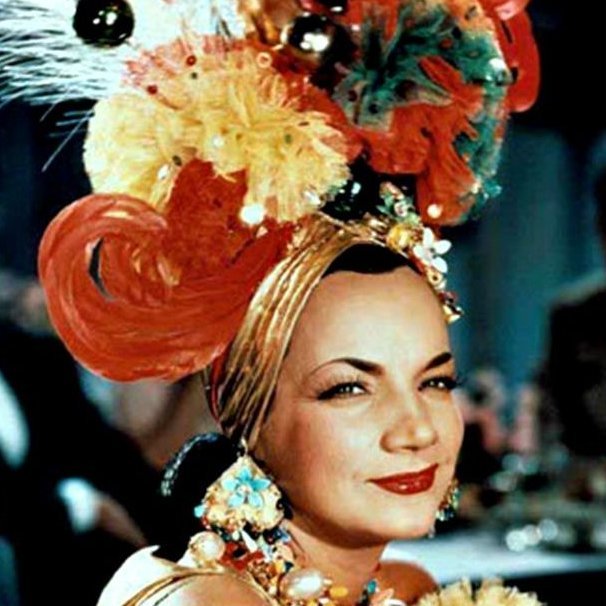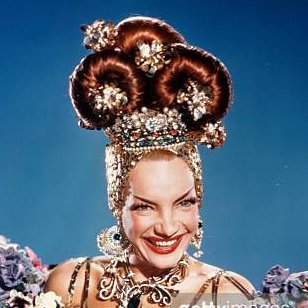Welcome to DU!
The truly grassroots left-of-center political community where regular people, not algorithms, drive the discussions and set the standards.
Join the community:
Create a free account
Support DU (and get rid of ads!):
Become a Star Member
Latest Breaking News
Editorials & Other Articles
General Discussion
The DU Lounge
All Forums
Issue Forums
Culture Forums
Alliance Forums
Region Forums
Support Forums
Help & Search
Movies
Related: About this forumOn this day, February 9, 1909, Carmen Miranda was born.
Singer/actress Carmen Miranda was #BornOnThisDay, Feb. 9, 1909. A #Portuguese-born #Brazilian star, popular during the #1930s to the 50s. A heavy smoker, drinker, who also took amphetamines & barbiturates, she passed in 1955 (age 46) from #heartattack. #RIP #GoneTooSoon #BOTD
Link to tweet


Carmen Miranda

Miranda in the New York Sunday News (1941)
Born: Maria do Carmo Miranda da Cunha; 9 February 1909; Marco de Canaveses, Portugal
Died: 5 August 1955 (aged 46); Beverly Hills, California, U.S.
Resting place: São João Batista Cemetery, Rio de Janeiro, Brazil
Website: www.carmenmiranda.com.br
Carmen Miranda GCIH OMC (Portuguese pronunciation: [ˈkaɾmẽȷ̃ miˈɾɐ̃dɐ]; born Maria do Carmo Miranda da Cunha; 9 February 1909 – 5 August 1955) was a Portuguese-born Brazilian samba singer, dancer, Broadway actress, and film star who was active from the 1930s on. Nicknamed "The Brazilian Bombshell", Miranda is known for her signature fruit hat outfit she wore in her American films. As a young woman, she designed hats in a boutique before making her first recordings with composer Josué de Barros in 1929. Miranda's 1930 recording of "Taí (Pra Você Gostar de Mim)", written by Joubert de Carvalho, catapulted her to stardom in Brazil as the foremost interpreter of samba.
During the 1930s, Miranda performed on Brazilian radio and appeared in five Brazilian chanchadas, films celebrating Brazilian music, dance, and the country's carnival culture. Hello, Hello Brazil! and Hello, Hello, Carnival! embodied the spirit of these early Miranda films. The 1939 musical Banana da Terra (directed by Ruy Costa) gave the world her "Baiana" image, inspired by African-Brazilians from the northeastern state of Bahia.
In 1939, Broadway producer Lee Shubert offered Miranda an eight-week contract to perform in The Streets of Paris after seeing her at Cassino da Urca in Rio de Janeiro. The following year she made her first Hollywood film, Down Argentine Way with Don Ameche and Betty Grable, and her exotic clothing and Lusophone accent became her trademark. That year, she was voted the third-most-popular personality in the United States; she and her group, Bando da Lua, were invited to sing and dance for President Franklin D. Roosevelt. In 1943, Miranda starred in Busby Berkeley's The Gang's All Here, which featured musical numbers with the fruit hats that became her trademark. By 1945, she was the highest-paid woman in the United States.
Miranda made 14 Hollywood films between 1940 and 1953. Although she was hailed as a talented performer, her popularity waned by the end of World War II. Miranda came to resent the stereotypical "Brazilian Bombshell" image she had cultivated, and attempted to free herself of it with limited success. She focused on nightclub appearances and became a fixture on television variety shows. Despite being stereotyped, Miranda's performances popularized Brazilian music and increased public awareness of Latin culture. In 1941, she was the first Latin American star to be invited to leave her hand and footprints in the courtyard of Grauman's Chinese Theatre, and was the first South American honored with a star on the Hollywood Walk of Fame. Miranda is considered the precursor of Brazil's 1960s Tropicalismo cultural movement. A museum was built in Rio de Janeiro in her honor, and she was the subject of the documentary Carmen Miranda: Bananas is My Business (1995).
{snip}

Miranda in the New York Sunday News (1941)
Born: Maria do Carmo Miranda da Cunha; 9 February 1909; Marco de Canaveses, Portugal
Died: 5 August 1955 (aged 46); Beverly Hills, California, U.S.
Resting place: São João Batista Cemetery, Rio de Janeiro, Brazil
Website: www.carmenmiranda.com.br
Carmen Miranda GCIH OMC (Portuguese pronunciation: [ˈkaɾmẽȷ̃ miˈɾɐ̃dɐ]; born Maria do Carmo Miranda da Cunha; 9 February 1909 – 5 August 1955) was a Portuguese-born Brazilian samba singer, dancer, Broadway actress, and film star who was active from the 1930s on. Nicknamed "The Brazilian Bombshell", Miranda is known for her signature fruit hat outfit she wore in her American films. As a young woman, she designed hats in a boutique before making her first recordings with composer Josué de Barros in 1929. Miranda's 1930 recording of "Taí (Pra Você Gostar de Mim)", written by Joubert de Carvalho, catapulted her to stardom in Brazil as the foremost interpreter of samba.
During the 1930s, Miranda performed on Brazilian radio and appeared in five Brazilian chanchadas, films celebrating Brazilian music, dance, and the country's carnival culture. Hello, Hello Brazil! and Hello, Hello, Carnival! embodied the spirit of these early Miranda films. The 1939 musical Banana da Terra (directed by Ruy Costa) gave the world her "Baiana" image, inspired by African-Brazilians from the northeastern state of Bahia.
In 1939, Broadway producer Lee Shubert offered Miranda an eight-week contract to perform in The Streets of Paris after seeing her at Cassino da Urca in Rio de Janeiro. The following year she made her first Hollywood film, Down Argentine Way with Don Ameche and Betty Grable, and her exotic clothing and Lusophone accent became her trademark. That year, she was voted the third-most-popular personality in the United States; she and her group, Bando da Lua, were invited to sing and dance for President Franklin D. Roosevelt. In 1943, Miranda starred in Busby Berkeley's The Gang's All Here, which featured musical numbers with the fruit hats that became her trademark. By 1945, she was the highest-paid woman in the United States.
Miranda made 14 Hollywood films between 1940 and 1953. Although she was hailed as a talented performer, her popularity waned by the end of World War II. Miranda came to resent the stereotypical "Brazilian Bombshell" image she had cultivated, and attempted to free herself of it with limited success. She focused on nightclub appearances and became a fixture on television variety shows. Despite being stereotyped, Miranda's performances popularized Brazilian music and increased public awareness of Latin culture. In 1941, she was the first Latin American star to be invited to leave her hand and footprints in the courtyard of Grauman's Chinese Theatre, and was the first South American honored with a star on the Hollywood Walk of Fame. Miranda is considered the precursor of Brazil's 1960s Tropicalismo cultural movement. A museum was built in Rio de Janeiro in her honor, and she was the subject of the documentary Carmen Miranda: Bananas is My Business (1995).
{snip}
#sambadasantiga
Carmen Miranda - Chica Chica Boom Chic
2,070,116 views • Feb 10, 2012
CineLeonor
3.88K subscribers
É carnaval no Leonor!
#sambadasantiga
Carmen Miranda - Chica Chica Boom Chic
2,070,116 views • Feb 10, 2012
CineLeonor
3.88K subscribers
É carnaval no Leonor!
#sambadasantiga
Thu Feb 9, 2023: On this day, February 9, 1909, Carmen Miranda was born.
Wed Feb 10, 2021: On February 9, 1909, Carmen Miranda was born.
InfoView thread info, including edit history
TrashPut this thread in your Trash Can (My DU » Trash Can)
BookmarkAdd this thread to your Bookmarks (My DU » Bookmarks)
0 replies, 367 views
ShareGet links to this post and/or share on social media
AlertAlert this post for a rule violation
PowersThere are no powers you can use on this post
EditCannot edit other people's posts
ReplyReply to this post
EditCannot edit other people's posts
Rec (2)
ReplyReply to this post